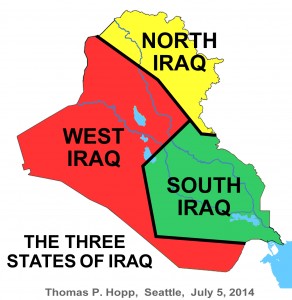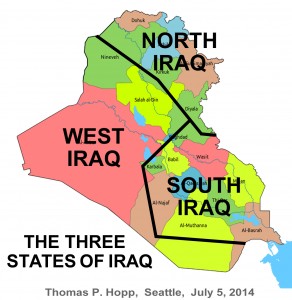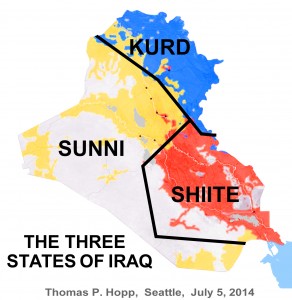 If Iraqis want the bloodshed to stop, they should create a Senate like the United States has. The not-so-democratic qualities of this institution could save their nation. I truly believe that.
If Iraqis want the bloodshed to stop, they should create a Senate like the United States has. The not-so-democratic qualities of this institution could save their nation. I truly believe that.
Let me explain, using some maps I drew for the purpose.
In the first, I have drawn some heavy black lines delineating three “States” within Iraq, similar to the U.S.’s states. Think of them like North Dakota, California, and Texas, if you will.
 In the second map, you can see these “states” contain within them subdivisions similar to U.S. congressional districts. I have rather arbitrarily slashed right across the boundaries of these “Governates,” as Iraqis call them. The reason why I did this is apparent in the third map: my “state” lines correspond roughly to the major religious and ethnic divisions of Iraq.
In the second map, you can see these “states” contain within them subdivisions similar to U.S. congressional districts. I have rather arbitrarily slashed right across the boundaries of these “Governates,” as Iraqis call them. The reason why I did this is apparent in the third map: my “state” lines correspond roughly to the major religious and ethnic divisions of Iraq.
So, imagine an Iraq with a Senate comprised of 7 senators from each of the three “states,” all elected by the total popular vote of their “state.” What would the institution be like?
 Well, it would not be democratic, for one thing. It would have an equal number of senators from the Shiite dominated south (all seven having been elected along religious lines by the Shiite majority), and the Sunni west (again, all Sunnis, no doubt) and the Kurdish north (same story there).
Well, it would not be democratic, for one thing. It would have an equal number of senators from the Shiite dominated south (all seven having been elected along religious lines by the Shiite majority), and the Sunni west (again, all Sunnis, no doubt) and the Kurdish north (same story there).
Equal numbers of senators despite South Iraq having three times the population of West Iraq? Does that seem fair? Does it sound like a recipe for religious and ethnic division and deadlock?
Maybe not.
Let’s assume the three groups of seven always vote as unified blocks (not necessarily true, but likely). There is actually no possibility of deadlock, simply because of the math. Whatever law or bill is favored by two of the groups wins. And even if there are some crossover voters, the odd number of the total, 21, dictates that either the yeas or the nays will win. No deadlock. The U.S. senate operates slightly differently than this, but the effect is the same.
The key to all this is as follows: the three-state division of the senate would give minorities a voice that they now lack. For instance, if the Shiite “state” tried to pass legislation that the Sunni and Kurd minorities didn’t like, those two “states” could unite to vote the law down.
As things now stand, the only legislative branch up and running in Iraq is their equivalent of the U.S. House of Representatives (their Council of Representatives). But this body is elected strictly by popular vote, just like the U.S. House. The problem with that is the lack of representation of minorities and domination of the Iraqi government by the Shiite majority. Hence the need for a Senate.
Of course, a Senate can’t alleviate every problem, but at least the minorities would have some means to get their concerns heard.
Finally, I should point out that the “states” don’t even have to be defined with lines on a map. Given the powerful divisions within Iraq, it would be just as simple to have voters register as Shiite, Kurd, Sunni (other minorities, like Christians and Turkomens might have to join one or another of the three groups as they see fit).
I really believe this “State” orientation would help the situation a lot. It works pretty well in the U.S., a nation with deep regional differences that once suffered though a brutal and bloody civil war of its own.
Why does a Senate help to calm regional anger? Precisely because it is not-so-democratic. Consider North Dakota, California, and Texas. These states are from far-flung regions of the United States and they often have strongly held, disagreeing points of view. But here’s the key: the tiny population of North Dakota has the same number of senators (two) as Texas, the largest state of the three, and California, the most populous.
So, the Senate is the great equalizer in American politics.
Give it a try, Iraq.







